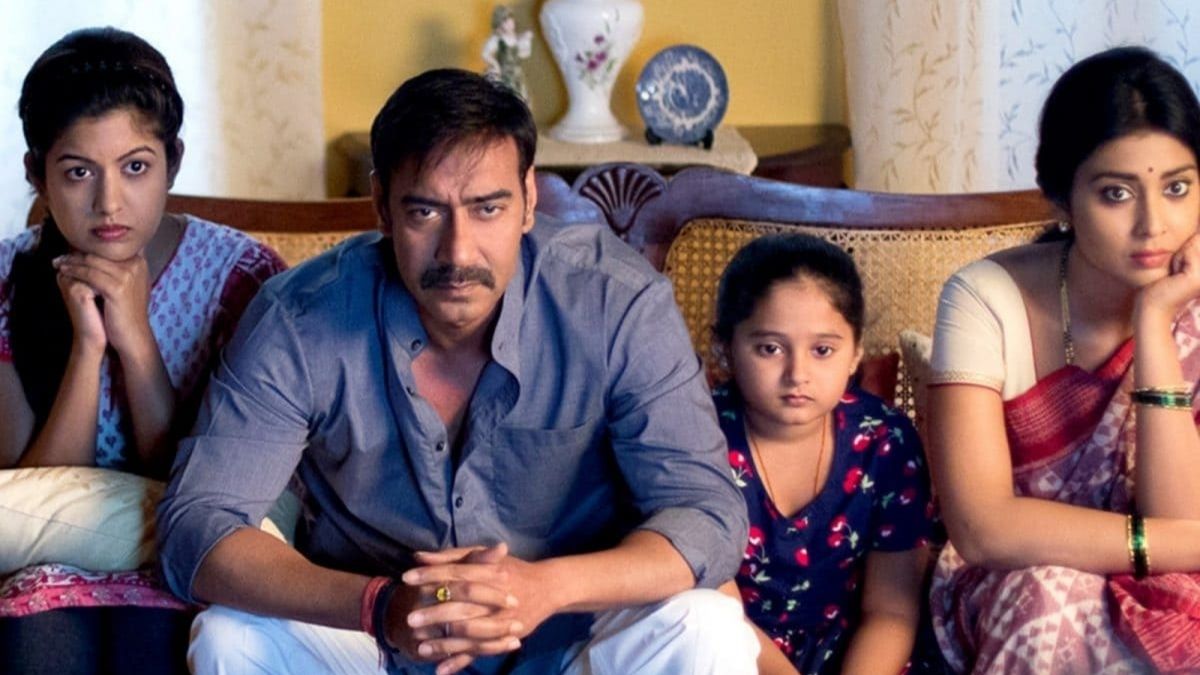
Wishyam Drishyam finishyam, soon!
Drishyam
Director: Nishikant Kamath
Actors: Ajay Devgn, Tabu
Rating: *1/2
The rate at which the film Drishyam has been remade over the past couple of years, you would imagine it’s some sort of Devdas. The original Drishyam (2013), written and directed by Jithu Joseph, I’m told, turned out to be Malayalam cinema’s hugest commercial success ever. Mohanlal played the lead role in that film. Kamal Haasan replayed that part in the movie’s Tamil version, which opened in theatres only a few weeks back. Ajay Devgan plays the same role in this Hindi remake.
What could be so staggeringly exciting about this script? Well… What was so great about Devdas? It was after all only a long drawn tragedy based on a miscommunication that could’ve been averted within a minute’s conversation between the lead pair Dev and Paro. Still, as a story it remains an important document and social comment of its times.
Sorry for that digression, but all I am trying to say is that the script of this film, on the other hand, is centred absolutely entirely on the plot alone. As should its review, therefore. It’s a story worth several crores, evidently.
And it goes something like this. Trust me, I’m revealing no national secrets, only this picture’s premise. There’s a teenaged, wonderfully cast lafanga type spoilt brat who’s taped on his cellphone nude video of a girl he meets at an inter-school camp.
He blackmails the girl. The girl, rightly, informs her mom (Shreya Sharan). Any sane mother would thereafter involve her husband, and bring in the chhotu boy’s parents into all of this, and sort the matter out within minutes.This mom, oddly enough, does no such thing. She confronts the boy, when he comes over to meet the girl secretly. There is a skirmish of sorts. The boy accidently dies. This is murder all right. The mother and daughter, along with the father (Ajay Devgan) and their youngest daughter, in this Goan middleclass family, now figure out ways to cover up the crime.
This is rather ridiculous, yes. But the silliness doesn’t end here. It actually starts from this point, although the filmmakers take at least half an hour to even get to the beginning. The boy is the only son of a top cop (Tabu). A mom, whose only son has gone missing, and for quite a few days already, would move heaven and earth, explore permutation, combination of every possibilityto find him. The inspector general of police before us, bathed in make-up, hot in uniform, is fixated on the Goan family instead. She feels that the family knows all there is to about her missing son. This suspicion is based merely on one relatively dodgy eyewitness account, that too of a cop who has a confirmed personal grudge against Ajay Devgn’s character.
The chief concern of the cop-mom in this picture is merely to suit the demands of this script. Which is to set up a cat and mouse kinda chase between Tabu and Ajay’s character. It seems a bit like the battle of wits between Anupam Kher and Naseeruddin Shah in A Wednesday (2008), a Hindi film that Kamal Haasan had similarly found fit to adapt for Tamil audiences. The reference to the sleeper hit A Wednesday is also apt because this film equally deals with crime, and punishment, or lack thereof.
The hero (Ajay) is the proverbial common man. He hasn’t studied beyond Class 4. This has to be mentioned again and again. His supreme confidence levels, suaveness coupled with street smarts, and general swagger hardly reveal much about his background. But that’s to be expected. The hero is a certified Bollywood star. Even when portraying an underdog from the underclasses, he mustn’t stop being Ajay Devgn. It’s only fair to his audience. The character has a remarkably sharp criminal bent of mind. The cop in comparison is far too many steps ahead of him. She can figure out everything.
This film, directed by Nishikant Kamath, is directed at audiences looking for over-simplified twists and turns, rather than a smart crime procedural, or detective fiction. Nishikant began his career with Dombivli Fast (2005), an angst-ridden Marathi moviethat I felt attempted to realistically redefine the ‘angry young man’. Mumbai Meri Jaan (2008) was a vague extension of the same theme. Since Force (2011) and more lately Lai Bhaari (in Marathi), the director’s taken the more crowd-pleasing, blockbuster route. Which is just as well.
Every moment in this pic is over-stated and obviously underlined. A Mohanlal fan describes the original Malayalam version to me as a movie that was so “tight”, “gripping” and “believable”. This one is anything but. You only wish that a film that also has absolutely nothing to say could keep things short while they’re being simple—especially given that the audience already knows who’s committed the murder, and why, and how. At over 160 minutes, the drishyam (scene) was getting blurry before my eyes. I’m sorry, but I was only hoping for its finishyam soon.
